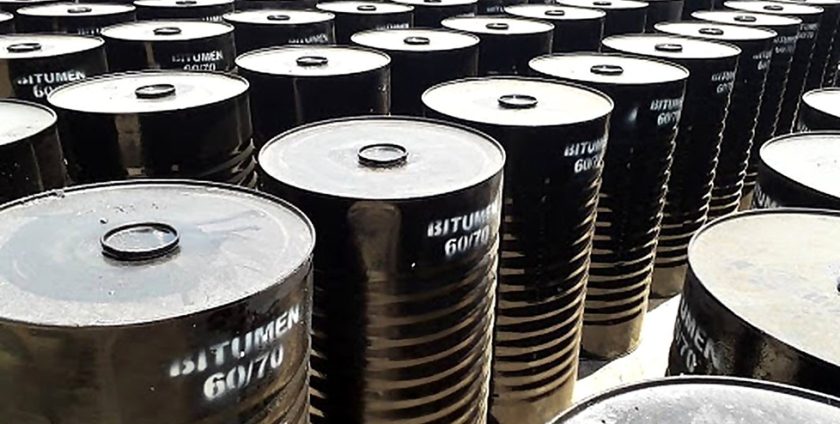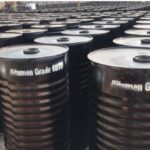
Bitumen 60/70 Price Factors – What Affects the Cost?
Bitumen 60/70 is a standard penetration-grade bitumen used globally in road construction, waterproofing, and civil engineering. The price of Bitumen 60/70 doesn’t stay static—it fluctuates due to a variety of economic, industrial, and logistical factors. For procurement professionals, project managers, and engineers, understanding these price influences is essential for budgeting, supply chain management, and project planning.
In this post, we’ll explore the key factors that affect the price of Bitumen 60/70, including raw material costs, global oil prices, regional demand, transportation logistics, and seasonal variation.
What is Bitumen 60/70?
Bitumen 60/70 is a medium hardness penetration-grade bitumen produced by refining crude oil. Its penetration value lies between 60 and 70 (measured in 1/10 mm), indicating its semi-solid consistency at ambient temperatures. This grade is ideal for:
-
🛣️ Asphalt paving
-
Road surfacing and sealing 🚧
-
Waterproofing membranes 🧱
-
Roofing and insulation systems 🏗️
Bitumen 60/70 is a penetration-grade bitumen that is characterized by its viscosity and penetration properties. The numbers 60/70 indicate the range of penetration values of the bitumen, measured in tenths of a millimeter. This type of bitumen is known for its high durability, adhesive properties, and resistance to water, making it an ideal choice for road construction, roofing, and various industrial applications.
Key Factors That Influence the Price of Bitumen 60/70
💹 1. Crude Oil Prices
Since bitumen is a by-product of crude oil refining, its price is tightly linked to international oil prices.
-
📈 Rising crude = higher bitumen prices
-
📉 Falling crude = lower refinery output cost
Market indicators like Brent Crude and WTI are essential references for predicting price trends.
🏭 2. Refining and Production Costs
The process of producing penetration-grade bitumen involves:
⚙️ High energy usage
👷♂️ Labor and operational costs
🔍 Quality assurance and standardization
An increase in refinery expenses directly contributes to the end price of Bitumen 60/70.
🌐 3. Global & Regional Demand
Construction seasons significantly influence demand. For instance:
🧱 Q2 and Q3 (spring/summer) = peak roadwork season
🌍 Demand spikes in South Asia, Africa, and the Middle East
📆 Government infrastructure budgets affect order timing
This demand surge causes periodic price inflation.
🚢 4. Transportation & Logistics Costs
The cost of moving bitumen to export and domestic markets includes:
🚛 Inland trucking to port
🛳️ Ocean freight or container rates
🏗️ Packaging (drums, bitutainers, or bulk)
🧾 Duties, port fees, and handling charges
Shipping route complexity and geopolitical risks can further raise prices.
💱 5. Currency Exchange Rates
Because most international trade in bitumen is settled in USD, currency fluctuations matter.
💵 Depreciation of local currency = higher landed cost
📉 Strong local currency = cost-efficient imports
Currency stability is vital for consistent pricing in developing economies.
📦 6. Supplier Terms, Volume & Packaging
Each supplier’s pricing depends on:
📦 Packaging type (new drums, bulk, jumbo bags)
📉 Order size (bulk discounts apply)
📋 Payment terms (LC, TT, or open account)
🚛 Delivery method (FOB, CIF, EXW)
Choosing an efficient packaging and supplier can reduce overall cost by 5–10%.
📊 Technical Specifications of Bitumen 60/70
| 🔍 Property | 📐 Typical Range |
|---|---|
| Penetration (25°C, 100g, 5s) | 60–70 (dmm) |
| Softening Point (R&B) | 49–56 °C |
| Ductility at 25°C | >100 cm |
| Flash Point | >220°C |
| Solubility in Trichloroethylene | >99% |
✅ Conforms to ASTM D946 and EN 12591 standards.
📈 Current Global Prices of Bitumen 60/70 (June 2025)
Prices for Bitumen 60/70 vary based on packaging, origin, and destination. Here’s a snapshot of current rates:
| Region/Port | Packaging | Price (USD/MT) | Source |
|---|---|---|---|
| FOB Bandar Abbas | New Steel Drum | 396 ± 3 | |
| FOB Bandar Abbas | Jumbo Bag | 386 ± 3 | |
| FOB Jebel Ali (UAE) | New Steel Drum | 464 ± 5 | |
| FOB Jebel Ali (UAE) | Jumbo Bag | 454 ± 5 | |
| CFR Port Klang | New Steel Drum | 408 ± 5 | |
| CFR Mombasa | New Steel Drum | 461 ± 5 | |
| FOB Iran (Bulk) | Bulk | 324–328 |
Note: Prices are indicative and subject to change based on market conditions.
🌍 Price Comparison by Region (Indicative Rates)
| 📍 Region | 💰 Price (USD/MT) | 📝 Notes |
|---|---|---|
| Middle East | 320–360 | Low freight cost, local production |
| South Asia | 350–400 | Peak seasonal demand in Q2–Q3 |
| Africa | 370–420 | Higher inland transport costs |
| Europe | 400–450 | Environmental compliance & shipping |
🔁 Prices updated monthly based on oil and freight markets.
Who Benefits from Price Transparency?
Knowing the pricing factors helps:
🧱 Contractors better plan bids and budgets
📈 Distributors manage procurement efficiently
🏛️ Government agencies avoid cost overruns
💼 Procurement officers forecast and negotiate
✅ Tips to Control Bitumen Price Volatility
📆 Order ahead of construction season
📉 Lock prices through forward contracts
🧭 Monitor crude oil benchmarks weekly
🔁 Work with regional suppliers to reduce freight
📦 Optimize packaging (bulk vs drum)
Future Prospects of Bitumen 60/70
The demand for bitumen 60/70 is expected to remain strong, driven by ongoing infrastructure development and urbanization worldwide. The construction of new roads, highways, and buildings will continue to require high-quality bitumen for durable and long-lasting surfaces.
1. Technological Advancements
Advancements in production technology and refining processes are expected to improve the efficiency and quality of bitumen 60/70. These innovations can lead to cost reductions and enhanced performance.
2. Sustainable Practices
The industry is increasingly focusing on sustainable practices to reduce the environmental impact of bitumen production and use. Efforts to develop eco-friendly bitumen and recycling initiatives will play a crucial role in the future.
3. Market Growth
The global market for bitumen 60/70 is expected to grow, driven by infrastructure projects in developing countries and maintenance activities in developed regions. This growth will create opportunities for suppliers and manufacturers.
Why Choose Peak Universal Business as Your Bitumen 60/70 Supplier?
1. Quality Assurance
Peak Universal Business is committed to providing high-quality bitumen 60/70 that meets stringent industry standards. Their products undergo rigorous testing to ensure purity, performance, and safety.
2. Expertise and Experience
With extensive experience in the industry, Peak Universal Business understands the diverse needs of their clients and offers expert guidance to help them find the right solutions.
3. Reliable Supply Chain
Peak Universal Business has a robust supply chain that ensures timely delivery of bitumen 60/70 to clients worldwide. Their efficient logistics and global reach make them a reliable partner for your projects.
4. Customer-Centric Approach
Customer satisfaction is a top priority for Peak Universal Business. They offer personalized service, competitive pricing, and reliable support to build long-term relationships with their clients.
5. Sustainable Practices
Peak Universal Business is committed to sustainable practices, including the use of eco-friendly materials and production processes. They strive to minimize their environmental impact and contribute to a greener future.
❓ FAQ – Bitumen 60/70 Pricing
📌 Why does Bitumen 60/70 pricing change frequently?
Bitumen 60/70 prices change due to several factors, including crude oil fluctuations, refinery costs, seasonal demand, currency exchange rates, and transportation charges. Each of these can rise or fall based on global and regional market shifts.
📌 Is bulk bitumen cheaper than bitumen in drums?
Yes, bulk bitumen is usually cheaper. It eliminates the cost of steel drums, reduces packaging expenses, and allows for more efficient transportation. Bulk delivery is ideal for large-scale projects and contractors aiming to reduce overall costs.
📌 What is the best season to buy Bitumen 60/70?
The best time to buy Bitumen 60/70 is during the off-season, usually in the first and fourth quarters of the year. During these periods, demand is lower due to less construction activity, which often leads to better pricing and faster availability.
📌 Does packaging type affect the final cost?
Absolutely. Packaging has a significant impact on cost. New steel drums are more expensive due to material and manufacturing charges. On the other hand, bulk and bitutainer options help reduce per-ton costs and simplify logistics.
📌 How can buyers get the most competitive Bitumen 60/70 rates?
To get the best price, buyers should consider ordering in larger volumes, choosing bulk or bitutainer packaging, tracking crude oil prices, and working with reliable exporters. Negotiating shipping terms (FOB or CIF) based on the delivery location also helps manage cost.
🔮 Future Outlook
Analysts predict that Bitumen 60/70 prices will remain relatively stable in the short term, barring significant geopolitical disruptions or drastic changes in crude oil prices. However, increased infrastructure projects in emerging economies could drive demand, potentially influencing prices upward.
🧾Conclusion- Price of Bitumen 60/70
Understanding the price factors of Bitumen 60/70 equips buyers and contractors with better forecasting and procurement tools. From raw material pricing to logistics and packaging, each factor has a direct impact on your total cost. Stay informed, time your purchases wisely, and partner with reputable suppliers to gain a competitive edge in your projects.
🛠️ Peak Universal Business stands out as a trusted supplier of high-quality bitumen 60/70, offering quality assurance, industry expertise, a reliable supply chain, a customer-centric approach, and a commitment to sustainable practices. By choosing Peak Universal Business as your supplier, you can ensure that you have access to the best materials and support for your industrial needs.
📢 Call to Peak Universal Business
📞 Need the best Bitumen 60/70 pricing for your project?
We in Peak Universal Business, offer competitive rates, bulk delivery options, and certified quality—delivered to your site or port.
✅ What You Get:
-
Fast quotes & flexible terms
-
CFR, FOB, or EXW delivery options
-
Steel drum, bitutainer, or bulk packaging
🔹 Request a Quote | 🔹 Download TDS | 🔹 Talk to a Bitumen Specialist
📧 Email: [email protected]
📞 Phone: +971 4 878 2031
🌐 Visit: PUBLtd. Bitumens
If You have any other Query or Question you want to ask, Please don’t hesitate to Contact Us.
- 0 comment





Leave a Reply